It wasn’t self-defense. A jury rejected Malcolm Whitfield’s argument that he fired a gun with any sort of justification and then convicted him of murder in the death of Shaquita Kelly.
A La Salle County jury deliberated about two hours Thursday and convicted Whitfield, 31, of Streator (also listed in DeKalb) of eight felonies, led by first-degree murder, for the 2023 Streator shooting that injured two others.
I think justice was done today – 100%."
— Joe Navarro, La Salle County state's attorney
Whitfield showed no reaction as the verdict was read. Two supporters hurriedly left the courtroom, and sobbing could be heard once the door was closed behind them.
Whitfield will stand for sentencing Oct. 3 in La Salle County Circuit Court, and there is a chance he’ll go to prison for the rest of his life.
Although he faces a complicated sentencing range, prosecutors had previously projected a top end north of 100 years if a jury convicted him of murder plus the most serious firearm charges, which would have to be served back to back.
Public Defender Ryan Hamer deferred comment until sentencing.
“I think justice was done today – 100%,” La Salle County State’s Attorney Joe Navarro said after the verdict, crediting the many law enforcement officers who “left no stone unturned” in the murder investigation.
“I didn’t think his story would hold with the story,” Navarro said. “I believe I was correct, and I believe the jury is correct. My other hope is this sends a message to other murder suspects that they should think twice before they go to trial.”
:quality(70)/cloudfront-us-east-1.images.arcpublishing.com/shawmedia/RUQJ5GGQNZDUZLEG4OZOEORRBU.jpg)
Hamer told jurors during closing arguments that he didn’t expect Whitfield to be acquitted of all charges. The defense conceded that he was at least guilty of unlawful possession of a weapon by a felon.
But Hamer nonetheless urged the jury to consider that Whitfield acted in self-defense, or to at least consider the lesser-included offenses of second-degree murder or involuntary manslaughter.
Hamer acknowledged that Whitfield lied repeatedly to police during an interview in Memphis, Tennessee, where Whitfield was apprehended five days after the shooting. Whitfield’s misstatements, he said, needed to be placed in context.
“He’s scared, he’s tired, he’s a desperate man trying to tell his story,” Hamer said.
Hamer said there was evidence that Whitfield’s life was in danger, noting that there were shell casings of varying color found at the two scenes, which suggested an exchange of gunfire. (He also named a potential triggerman who might have aimed at Whitfield, but that individual wasn’t charged in connection with the Kelly shooting.)
Prosecutor Matt Kidder argued that lesser-included convictions, such as manslaughter, weren’t appropriate because Whitfield acted with intent rather than recklessly.
“There wasn’t an ounce of reckless conduct in this,” Kidder said. “He aimed and fired at three people and hit them.”
Prosecutor Kelley Porter argued that Whitfield had plenty of motive. The Kelly shooting followed an armed fracas two hours earlier in Streator. Although Whitfield disavowed any bad conduct or intent, Porter said Whitfield had an ax to grind.
“This is about retaliation,” Porter said, adding later: “We know this isn’t self-defense. We know there’s no reasonable belief he needs to defend himself.”
It might not have helped that Whitfield declined to testify. Although a defendant can argue self-defense without telling his side of the story, Whitfield’s decision not to take the stand left the jury without an alternate explanation for the shots fired.
:quality(70)/cloudfront-us-east-1.images.arcpublishing.com/shawmedia/J7VQCU34TFBQJOWH4CTKR5LJZI.jpg)

:quality(70)/s3.amazonaws.com/arc-authors/shawmedia/638ad18c-1176-4018-bcef-b5560cf36d58.png)